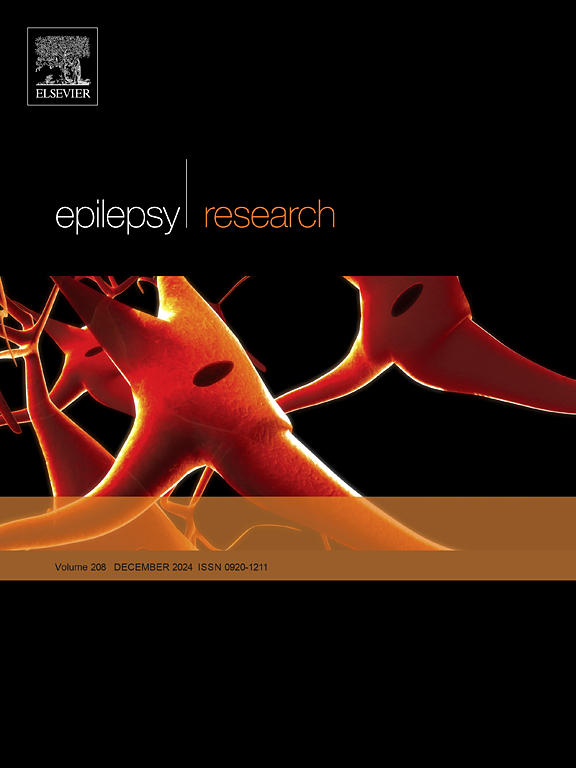Seizure in the emergency department: Risk and predictors of early recurrency during observation
IF 2
4区 医学
Q3 CLINICAL NEUROLOGY
引用次数: 0
Abstract
Objective
This study aimed to determine the risk of early seizure recurrence and identify potential predictive factors for focal or generalized seizures among patients presenting to the emergency department.
Methods
We conducted a two-year observational study involving all consecutive patients admitted to the emergency department for seizures. Early recurrent seizures were defined as those occurring within 24 h of admission. Clinical and neurological features, blood tests, brain computed tomography scans, and electroencephalographic testing were analyzed. Kaplan-Meier survival analysis was used to determine the median time median time to early recurrent seizures. Univariable and multivariable logistic and Cox proportional hazards models were used to investigate potential predictors of recurrence.
Results
Among the 433 enrolled patients, 92 (21 %) experienced an early recurrent seizure within 24 h. Sixty-three patients had a recurrence within 6 h, while only 19 patients (4.4 %) experienced recurrence between 12 and 24 h after arrival. Abnormal EEG findings (epileptiform or non-epileptiform alterations) and alcohol withdrawal were significantly associated with early recurrent seizures in univariate and multivariate analyses.
Conclusion
Overall, about a fifth of patients presenting with seizures to the emergency department experienced early recurrence within 24 h, with most of these occurring within the first 6 h. Abnormal EEG findings and alcohol withdrawal were significantly associated with an increased risk of early recurrence.
急诊科的癫痫发作:观察期间早期复发的风险和预测因素
目的本研究旨在确定急诊科患者早期癫痫发作复发的风险,并确定局灶性或全身性癫痫发作的潜在预测因素。方法:我们进行了一项为期两年的观察性研究,纳入了所有因癫痫发作而连续入住急诊科的患者。早期复发性癫痫发作定义为入院后24 h内发生的癫痫发作。分析临床和神经学特征、血液检查、脑计算机断层扫描和脑电图检查。Kaplan-Meier生存分析用于确定早期复发发作的中位时间。使用单变量和多变量logistic及Cox比例风险模型来研究复发的潜在预测因素。结果在433例入组患者中,92例(21. %)在24 h内出现早期复发性癫痫发作。63例患者在6 h内复发,而只有19例患者(4.4 %)在到达后12 - 24 h内复发。在单因素和多因素分析中,异常脑电图(癫痫样或非癫痫样改变)和酒精戒断与早期复发性癫痫发作显著相关。总体而言,约五分之一的癫痫患者在24 h内早期复发,其中大部分发生在前6 h内。异常脑电图结果和酒精戒断与早期复发风险增加显著相关。
本文章由计算机程序翻译,如有差异,请以英文原文为准。
求助全文
约1分钟内获得全文
求助全文
来源期刊

Epilepsy Research
医学-临床神经学
CiteScore
0.10
自引率
4.50%
发文量
143
审稿时长
62 days
期刊介绍:
Epilepsy Research provides for publication of high quality articles in both basic and clinical epilepsy research, with a special emphasis on translational research that ultimately relates to epilepsy as a human condition. The journal is intended to provide a forum for reporting the best and most rigorous epilepsy research from all disciplines ranging from biophysics and molecular biology to epidemiological and psychosocial research. As such the journal will publish original papers relevant to epilepsy from any scientific discipline and also studies of a multidisciplinary nature. Clinical and experimental research papers adopting fresh conceptual approaches to the study of epilepsy and its treatment are encouraged. The overriding criteria for publication are novelty, significant clinical or experimental relevance, and interest to a multidisciplinary audience in the broad arena of epilepsy. Review articles focused on any topic of epilepsy research will also be considered, but only if they present an exceptionally clear synthesis of current knowledge and future directions of a research area, based on a critical assessment of the available data or on hypotheses that are likely to stimulate more critical thinking and further advances in an area of epilepsy research.
 求助内容:
求助内容: 应助结果提醒方式:
应助结果提醒方式:


